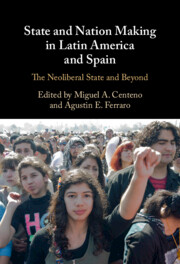Book contents
- State and Nation Making in Latin America and Spain
- State and Nation Making in Latin America and Spain
- Copyright page
- Dedication
- Contents
- Notes on Contributors
- Preface
- Part I Introduction
- Part II Economic and Territorial Power
- 2 The Chilean Neoliberal State
- 3 State, Society, and the Neoliberal Turn in Mexico, c. 1980–c. 2000
- 4 Rise of the Neoliberal State in Spain? Fiscal Shortcomings of a Popular Narrative
- 5 Guatemala
- Part III Infrastructural Power: Reform Strategies
- Part IV Symbolic Power: Identities and Social Protest
- Part V Conclusions
- Index
- References
4 - Rise of the Neoliberal State in Spain? Fiscal Shortcomings of a Popular Narrative
from Part II - Economic and Territorial Power
Published online by Cambridge University Press: 03 August 2023
- State and Nation Making in Latin America and Spain
- State and Nation Making in Latin America and Spain
- Copyright page
- Dedication
- Contents
- Notes on Contributors
- Preface
- Part I Introduction
- Part II Economic and Territorial Power
- 2 The Chilean Neoliberal State
- 3 State, Society, and the Neoliberal Turn in Mexico, c. 1980–c. 2000
- 4 Rise of the Neoliberal State in Spain? Fiscal Shortcomings of a Popular Narrative
- 5 Guatemala
- Part III Infrastructural Power: Reform Strategies
- Part IV Symbolic Power: Identities and Social Protest
- Part V Conclusions
- Index
- References
Summary
Whether the model of the neoliberal state is conceived in terms of the history of ideas or political economy, a specific reorganization of fiscal relations is always at the center of the debate. The neoliberalization of the state is supposed to be achieved through the containment of inflation and public debt, the reallocation of the declining tax burden to consumption, and the creation of economic competitiveness through low-income, corporate, and capital gains taxes. Although the Spanish state has pursued neoliberal policies in various areas since the 1990s, its tax policy has always been at odds with neoliberal ideas. Instead, and in contrast to developments in Latin America, its political elites never abandoned the idea of progressive taxation. Moreover, they have been guided by the European model of the tax state, whose two pillars, VAT and progressive income taxation, have never been touched in principle. The concept of neoliberalism, therefore, suggests a problematic interpretation of the Spanish state’s recent history. This finding presents us with a critical choice: Either neoliberalism is not deeply attached to specific tax policies, or the narratives of neoliberalization, which have nevertheless become popular, fail to capture its history.
- Type
- Chapter
- Information
- State and Nation Making in Latin America and SpainThe Neoliberal State and Beyond, pp. 141 - 174Publisher: Cambridge University PressPrint publication year: 2023



